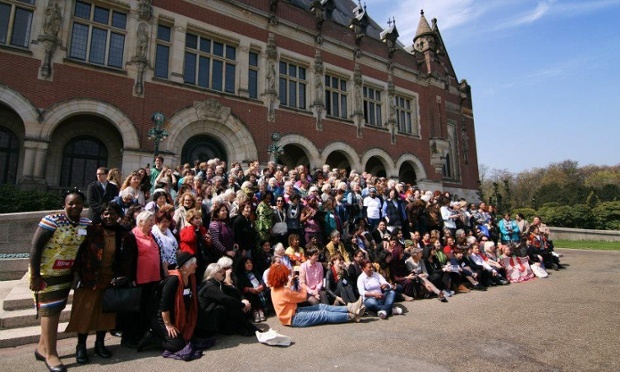|
Shirin Ebadi: 'If books had been thrown at the Taliban instead of bombs … we would not have Isis'

Delegates of the Women’s International League for Peace and Freedom 2015 Centennial Congress, The Hague.
Photograph: Mir Grebäck von Melen/WILPF
The Nobel laureate called on governments to cut arms budgets and increase education spending at a female peacemakers’ conference in The Hague
If books instead of bombs had been thrown at the Taliban, and if schools had been built in response to the terrorist attacks on New York in 2001, we would not now be contending with Isis, Nobel laureate Shirin Ebadi told a conference on Monday.
Ebadi, who was awarded the Nobel peace prize in 2003 for her work in promoting human rights in Iran, criticised the west for how it dealt with terrorist groups in the Middle East, and called on governments to cut their arms budgets.
Speaking in The Hague at the 100th anniversary of the Women’s International League for Peace and Freedom (WILPF), Ebadi said: “If books had been thrown at the Taliban instead of bombs, and had schools been built in Afghanistan – 4,000 could have been built in memory of the 4,000 people who died in 9/11 – at this time we would not have Isis.
“Let’s not forget the roots of Isis rest in the Taliban. Let’s not repeat the experience. We have to remember that Isis is not simply a terrorist group, but an ideology, and ideologies cannot be fought with bombs. This ideology can only be fought with the correct interpretation of religion. Four Nobel laureates addressed the audience of more than 900 delegates from 80 countries. A fifth Nobel laureate, Tawakkol Karman, the Yemeni rights activist who received the prize in 2011, was unable to travel.
“We don’t need another cold war, or to demonise other countries or dehumanise leaders,” said Mairead Maguire, who was awarded the Nobel peace prize in 1976 for her work addressing sectarian violence in Northern Ireland. “We have no right to dehumanise other people and then take them out. How far have we sunk when we can sit down and plan how to take out another human being because we don’t agree with their politics?”
Madeleine Rees, secretary general of WILFP since 2010, told the audience the global system was not equipped to bring peace. “We have a UN system, we have a charter, a declaration of human rights and we have treaties and conventions. We’ve had four world conferences on women, we have the women, peace and security agenda and world courts to adjudicate on all the above. So we should be pleased. But it’s not working. We’re still not able to bring the peace we have been demanding.”
Anthony Keedi, programme manager at Abaad: Resource Center for Gender Equality, which works in the Middle East and north Africa, said men were conditioned to think that conflict is natural, but violence is a choice. “Men are taught not to empathise, not to cry or show vulnerability as these are weaknesses. They are taught to be stoic,” he said. “Being taught not to empathise makes it easier to point and kill, to act violently.”
Part of Abaad’s work is to offer free psychosocial support to men and boys to reduce violence.
|
|
|
|
The Mary Initiative
A Bridge of Understanding
Operational, Safety, Security & First Aid Training for NGO's
|
|
|
|